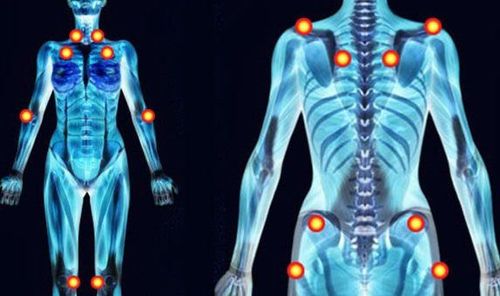This is an automatically translated article.
The article is written by Master, Doctor Mai Vien Phuong - Gastroenterologist - Department of Medical Examination & Internal Medicine - Vinmec Central Park International General Hospital.
Not all fibromyalgia symptoms in pregnant women are created equal. However, most pregnant women experience increased pain, especially in the last months of pregnancy. This is a time when even healthy women tend to experience more discomfort.
1. What is fibromyalgia?
Fibromyalgia is a multisystem disease. Therefore, pregnant women with fibromyalgia will affect the pregnancy. Fibromyalgia is commonly associated with:
Nervous system and muscles Immune system Several different hormones Autonomic nerve control of the skin, heart, blood vessels, digestive tract, and bladder. Symptoms such as persistent, widespread pain and severe fatigue that often last for years (if not indefinitely) are characteristic of this disease.
Fibromyalgia is a disease that causes many misunderstandings. One of the myths is that it is a disease of middle-aged and elderly women. However, children and men are also affected. In particular, more than half of all women with fibromyalgia are under the age of 40 and still of reproductive age.

2. How does pregnancy affect fibromyalgia symptoms?
Not all fibromyalgia symptoms in pregnant women are the same. However, most pregnant women experience increased pain, especially in the last months of pregnancy. This is when even healthy women tend to experience more discomfort.
At this point in pregnancy, a woman will feel:
Rapid weight gain. Fetal Growth Rapidly There is increased pressure on the low back, which is often a problem area for people with fibromyalgia. On the other hand, chemicals like relaxin are released in the body during pregnancy, they help to relax the muscles. This can have a number of beneficial effects. However, most normal women with fibromyalgia will notice increased pain in the low back and hip area.
3. How does fibromyalgia affect pregnancy?
Fibromyalgia does not usually negatively affect a woman's fertility. However, women as well as men with fibromyalgia will experience discomfort during sexual activity. Therefore, this is the reason why they are less likely to engage in sexual activities.
Once a woman has a baby, fibromyalgia can affect the pregnancy itself. One study observed 112 pregnant women with fibromyalgia in Israel. The results showed that these women were more likely to:
Have a smaller baby Repeated miscarriage (about 10% of women) Pregnant women with fibromyalgia Abnormal blood sugar High amniotic fluid However, they are also less likely to give birth prematurely.
4. Is fibromyalgia drug treatment dangerous for pregnancy?
Very few drugs are approved for use during pregnancy, regardless of the condition they are being used to treat. Some drugs are purportedly not tested on pregnant women. Therefore, there is little research on their effects on pregnancy.
Therefore, pregnant women need to discuss with their doctor the various benefits and risks of stopping or continuing to take fibromyalgia medications.
5. What is the best way to treat fibromyalgia during pregnancy?
Fortunately, medication is not the only proven effective treatment for fibromyalgia. Meditation, yoga, and ointments may help. Massage can also help, as long as it's not too aggressive.
Swimming therapy or sitting in a hot tub can be helpful for people with back pain and in the late stages of pregnancy. Exercise is also important but must be tailored to each individual's ability and endurance.
Rest is paramount. Even healthy pregnant women should sit or lie down to reduce pressure on their backs and legs. Schedule 20 to 30 minute breaks during the day.
6. Does fibromyalgia affect delivery?
Women with fibromyalgia have a greater impact on labor and delivery than women without the condition. However, there is no evidence for a significant difference.
As mentioned earlier, fibromyalgia does not appear to lead to preterm birth. This suggests that women with fibromyalgia are just as tolerant of pain during labor as other women.
7. What happens after the baby is born?
Many people believe that a woman's fibromyalgia will continue to get worse for a period of time after giving birth. People with fibromyalgia often have very disrupted sleep. Research has shown that, when their sleep is affected, the pain increases, especially in the morning.
It is important that the mother's mood is closely monitored, as postpartum depression can be missed or misinterpreted as fibromyalgia.

8. What is important to consider when planning a pregnancy?
Once you've decided pregnancy is what both you and your partner want, make sure you have the proper support. It's important to have a doctor who listens, a therapist to turn to, a supportive partner, and help from friends and family members.
Breastfeeding is ideal for the baby, but you may need to choose bottle-feeding if you must continue taking medication to control fibromyalgia symptoms.
9. Does fibromyalgia affect the health of the mother after giving birth and the care of the child?
There is no evidence that going through pregnancy will make fibromyalgia worse within the first six months after giving birth. By then, you should be able to continue taking any medications to control symptoms. However, you will continue to ask for the support of your partner and family and friends, just like all mothers do.
Please dial HOTLINE for more information or register for an appointment HERE. Download MyVinmec app to make appointments faster and to manage your bookings easily.
References:
Conversano C, et al. (2019). Potentially traumatic events, post-trauma stress disorder and post-traumatic stress spectrum in patients with fibromyalgia. ncbi.nlm.nih.gov/pubmed/29745889 Karns M, et al. (n.d.). Fibromyalgia fixes: Treatments worth trying. arthritis.org/about-arthritis/types/fibromyalgia/articles/fibromyalgia-treatments.php Zioni, T., Buskila, D., Aricha-Tamir, B., Wiznitzer, A., Sheiner, E. (2011). Pregnancy outcomes in patients with fibromyalgia syndrome. Journal














